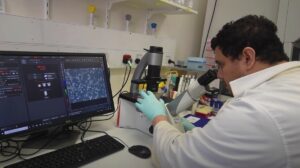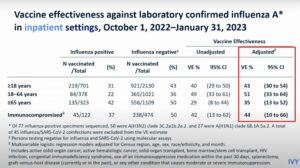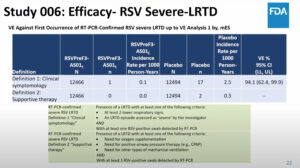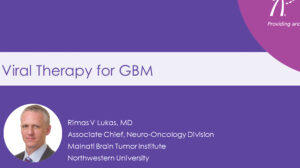NEW YORK (Reuters Health) – After chemotherapy-induced remission of follicular lymphoma, vaccination with a patient-specific tumor-derived antigen improves disease-free survival, a multicenter team has shown. Furthermore, the vaccine isotype appears to be the key to efficacy, according to the report in the Journal of Clinical Oncology online May 30.
Dr. Larry W. Kwak, with the University of Texas MD Anderson Cancer Center in Houston, and colleagues explain that follicular lymphoma is an indolent B-cell lymphoma, and because B-cell malignancies are clonal proliferations, the unique immunoglobulin (Ig) variable regions — or idiotype (Id) — on the surface of the tumor cells are distinct from other normal B-cells.
Hence, “The idiotypic determinants of the surface Ig of B-cell lymphoma can therefore serve as a tumor-specific antigen for therapeutic vaccine development.”
Prior studies, the authors continue, showed that a recombinant Id antigen, conjugated to keyhole limpet hemocyanin (KLH) and administered with granulocyte monocyte colony-stimulating factor (GM-CSF) as an adjuvant, demonstrated feasibility but induced mainly humoral responses. Then, it was found that cellular immune response could be induced with autologous hybridoma-derived Id-KLH + GM-CSF in patients with follicular lymphoma after first complete remission following chemotherapy.
This prompted the current randomized, controlled, double-blind trial in which 177 such patients who achieved complete remission with chemotherapy were randomly allocated 2-to-1 to receive conjugated idiotype vaccine and adjuvant (Id-KLH + GM-CSF) or control treatment with just KLH + GM-CSF.
The primary endpoint was disease-free survival. Because 60 patients were not vaccinated because of relapse or other reasons, the intention-to-treat results were not impressive. Median disease-free survival was 23.0 months in the Id-vaccine group and 20.6 months in the control group (hazard ratio 0.81; p =0.256).
However, on a per-protocol basis involving the 117 patients who received at least one dose of the study treatment, corresponding rates were 44.2 months versus 30.9 months (HR 0.62; p=0.047).
The researchers went further, and in an unplanned subgroup analysis looked at vaccinated patients by IgM or IgG isotypes – excluding two patients who had mixed IgM/IgG biopsy isotypes.
Median time to relapse was significant only in the group of patients receiving IgM-Id vaccine versus controls: 52.9 vs 28.7 months (p=0.001). In the groups receiving IgG-Id vaccine, the times were 35.1 vs 32.4 months (p=0.8).
“Our results suggest that the isotype of the Fc region may influence immunogenicity of Id vaccines,” Dr. Kwak and colleagues conclude. “If confirmed, our findings will have profound implications on Id vaccine production strategies and clinical development for follicular lymphoma and other B-cell malignancies.”
“These findings are intriguing,” Dr. Stephen M. Ansell and Dr. Vera J. Suman, with the Mayo Clinic in Rochester, Minnesota, comment in a related editorial, “but a significant issue that makes additional testing necessary and integration of this approach into clinical practice challenging is the omission of rituximab from the initial treatment regimen.”
They conclude, “In the face of multiple other treatment options for patients with follicular lymphoma that include maintenance therapy with rituximab, radioimmunotherapy, or novel, small-molecule approaches, it is difficult to determine where a vaccine approach fits into the therapy of newly diagnosed patients.”
Reference:
Vaccination With Patient-Specific Tumor-Derived Antigen in First Remission Improves Disease-Free Survival in Follicular Lymphoma
J Clin Oncol 2011;29.




